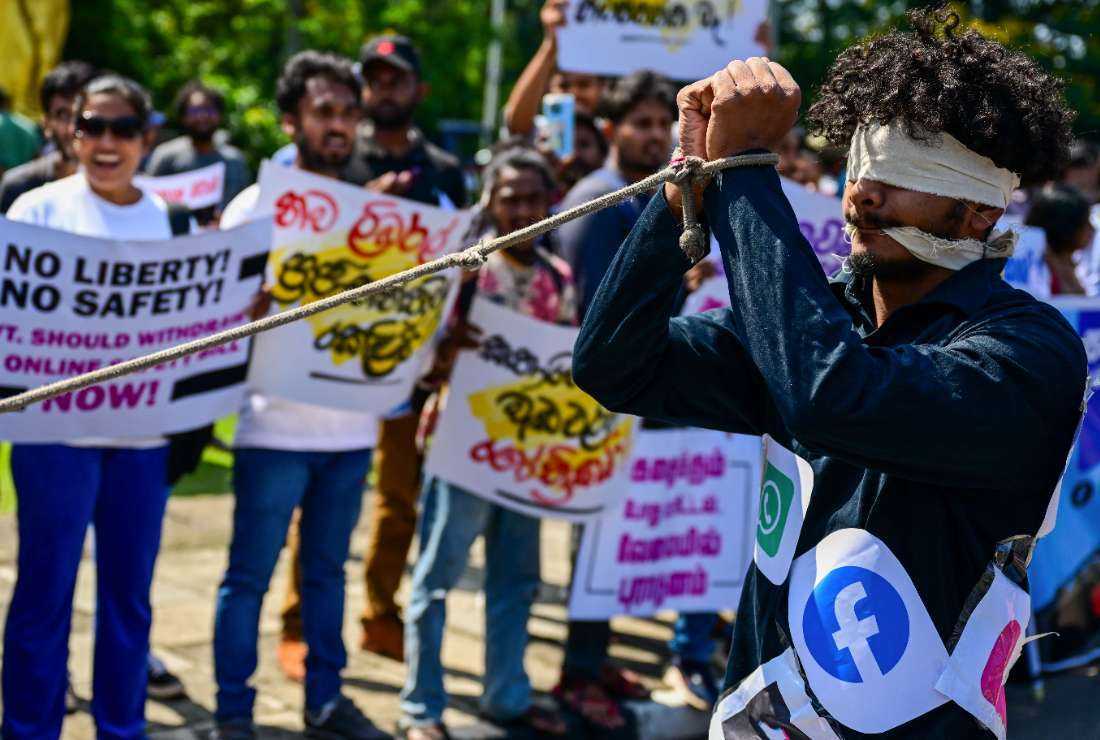
A blindfolded activist with a rope tied around his wrists and covered with logos of different social media platforms takes part in a protest against the proposed ‘Online Safety Bill’, near the parliament building in Colombo on Jan. 24. Sri Lanka’s parliament passed the social media regulation bill dubbed ‘draconian’ by the opposition, which could make companies criminally liable for posts authorities deem harmful. (Photo: AFP)
The Online Safety Bill was passed in parliament on Jan. 24 despite strong objections from opposition politicians, activists, Church and civil society organizations.
The new law grants broad powers to an Online Safety Commission to decide what constitutes prohibited statements and make recommendations to internet service providers to remove such content and disable access for those deemed offenders.
The commission is also empowered to mete out punishments, including five-year jail terms and heavy fines for social media users.
Opposition legislators protested the passing of the bill claiming that the amendments made to it did not fully conform to a ruling by the Supreme Court, which held that some of its provisions were unconstitutional.
Father Reid Shelton Fernando, former chaplain of the Young Christian Workers Movement in Colombo archdiocese, described it as “a draconian law” and pointed to the “risk in allowing this commission to determine the truth.”
“The president has the power to appoint all members of the commission, affecting its independence,” he said.
Fernando, a prominent rights activist, said that “not only was there no extensive discussion on the bill, but people still lack a serious understanding of its effects now that it has become law.”
President Ranil Wickremesinghe’s government said the law is aimed at battling cybercrime including child abuse, data theft and online fraud.
“It is not to suppress the media or the opposition… Sri Lanka had 8,000 cybercrime complaints last year. We all agree that we need laws to address these issues,” Public Security Minister Tiran Alles said while introducing the bill in the House.
“Does the country need such an act? The government did not listen to the concerns of the people. It wants to subjugate social media space because it will be difficult for them to win the next election,” said Nuwan Thusarini, a university student and rights activist.
She said the new law will not only affect but also have an impact on mainstream media.
“Everybody urged the government not to pass the bill, but it had its political agenda,” Thusarini added.
Thyagi Ruwanpathirana, regional researcher for South Asia at Amnesty International said the passing of the Online Safety Act “is a major blow to human rights in Sri Lanka.”
“The act is the newest weapon in the government’s arsenal of tools that could be used to undermine freedom of expression and suppress dissent,” she said. Ruwanpathirana said many parts of the law do not meet international human rights standards regarding freedom of expression and privacy online, and were vaguely worded.
“As people grapple with and voice their concerns amid hardships during Sri Lanka’s economic crisis and the impact of the government’s austerity measures, this legislation will be ripe for misuse by authorities. It will likely be used to further restrict civic space and crack down on critics and opposition,” she added.
Ruwanpathirana expressed concern about its misuse in a year of elections in a country with a long history of cracking down on protests.
“Sri Lankan authorities must demonstrate the political will to uphold their international human rights obligations and commitments by guaranteeing and ensuring respect for human rights before, during, and after elections,” she said.
The United States expressed concern over the controversial law to control online discourse.
US ambassador, Julie Chung in a statement posted on social media on Jan. 25, said: “The United States remains concerned about the potential impact of Sri Lanka’s Online Safety Bill, which passed without incorporating important input from key stakeholders, including civil society and tech companies. They argue that this legislation threatens freedom of expression, innovation, and privacy.”
Chung added that vague and overly restrictive legislation can hinder investment and the development of a digital economy, undermining the economic growth that Sri Lanka needs.
“The US urges Sri Lanka to prioritize transparency and ensure any legislation does not stifle the voices of its people,” she added.
The UN Office of the High Commissioner on Human Rights said the bill will have a chilling effect on freedom of expression.
The Asian Internet Alliance, the International Commission of Jurists, the Bar Association of Sri Lanka, and the Human Rights Commission of Sri Lanka also have raised concerns about the problematic aspects of the new law.
A group of activists and opposition members protested against the legislation outside parliament on the day it was passed.
“This legislation is a threat to our democracy,” said Harsha de Silva, a lawmaker of Sri Lanka’s main opposition Samagi Jana Balawegaya.
